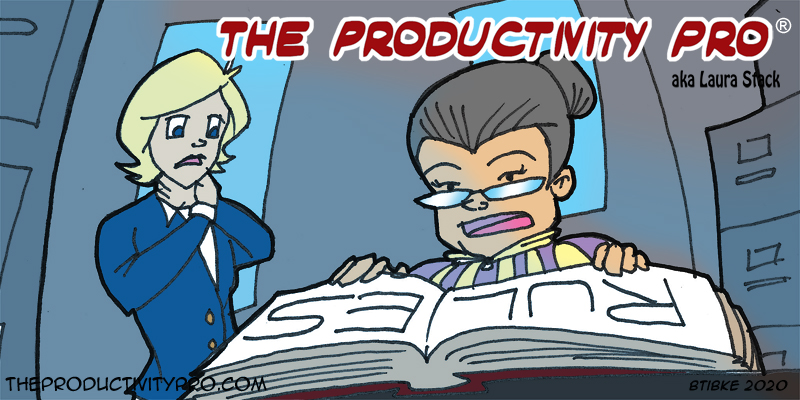
“Rules are mostly made to be broken, and are too often for the lazy to hide behind.” – General Douglas MacArthur.
Too few rules results in anarchy; too many stifle advancement and kill productivity. One role of management is to find a workable balance between the two extremes. It’s imminently possible, but not easy, as I’ve chronicled in this blog for years: hence everything from too much paperwork, emails, and meetings on one end, to excess social media and Internet use on the other, and back to micromanaging, timewasting initiatives, and overly rigid adherence to process. In some offices, productivity becomes little more than a side-effect of the workplace process.
The symptoms are easily visible. There’s an old tale, possibly apocryphal, about the early days of a joint U.S/Japanese car-making enterprise. At one point, a timewasting argument erupted in the U.S. manufacturing plant about who was allowed to turn off a specific machine, based on union rules. A Japanese executive mooted the argument by unplugging the machine. He wasn’t bound by the rules blinding the others; all he cared about was results.
Some rules, like attendance policies, forced ranking, dress-codes, bereavement policies, inappropriate processes (Six Sigma, for example, was meant for manufacturing, not office work) and others imposed for faddish or micromanagement reasons can end up focused on themselves more than the outcome. When this happens, they just take away workers’ choices.
There are many ways an over-dependence on rules can kill productivity; it would take a book to explore them all, so let’s take a quick look at a few of the most obvious. Imposing too many rules:
-
-
- Stifles engagement, one key to maximal performance in any job. Take all the enjoyment out of work or make it hard to even do the work, and no one will want to own their jobs. They’ll leave taking ownership to management — the same management that’s already abdicated one of its prime responsibilities by imposing stupid rules. Jobs aren’t necessarily meant to be fun, but they aren’t meant to be unbearable and over-stressful, either. Sometimes the pay just isn’t worth the pain.
- Hampers efficiency. Overregulation —including mandatory meetings —wastes productive time. It also separates blocks of productive work, hindering focus. Forced documentation of every little thing, reams of emails, unnecessary process layers, increasing numbers of permission points, and too many required daily tasks only hems in workers and slows the work process.
- Discourages questions, because questions steal valuable productive time and may result in new rules and reports that slow the work process even farther. Also, questions bring the questioners to the attention of management, which, while not always bad, can be terrible if they’re micromanaging already. Plus, workers don’t ask each other questions, because those questioned often lack time to help the questioners (see #5).
- Stifles creativity. Workers simply don’t have time to propose creative new solutions when their productivity is at risk or already suffering. When you’re hurrying to get your required work done, you’re too harried to think about anything else — another shoot-yourself-in-the-foot effect.
- Isolates workers, again because they have so much work to complete they don’t have time to deal with other people’s requests, whether for aid or information. This limits productivity and cripples team effectiveness. They may become reluctant even to work with those they should work with, because any interaction requires a period of less-productive time as the individuals come to learn about and adapt to each other’s work habits.
- Damages morale. If you find yourself experiencing all of the above every day, you may find it soul-crushing — especially if each day results in new rules. A tech writer colleague once had a technical editor who issued new stylebook changes at least once a week, requiring every writer in the department to change every document they oversaw several times a month to match the new rules. This required a lot of non-productive work, which finally ended when the department manager limited the editor’s edicts to no more than once a month.
-
Hit the Road, Jack
If you see any of these problems on your own team, find a way around the offending rules — or even better, find ways to dismantle them. Otherwise, you’ve hitched your wagon to a falling star. Rules of conduct and process are important, but if you don’t take care, they can take over, replicating themselves for their own sake until process fossilizes and paralyzes the organization. This seems inevitable as businesses grow larger. If your business doesn’t regularly crack that shell of self-perpetuating blandness and molt into something shiny and new, it will die.
© 2020 Laura Stack. Laura Stack, MBA, CSP, CPAE is an award-winning keynote speaker, bestselling author, and noted authority on employee and team productivity. She is the president of The Productivity Pro, Inc., a company dedicated to helping leaders increase workplace performance in high-stress environments. Stack has authored eight books, including FASTER TOGETHER: Accelerating Your Team’s Productivity (Berrett-Koehler 2018). She is a past president of the National Speakers Association, and a member of its exclusive Speaker Hall of Fame (with fewer than 175 members worldwide). Stack’s clients include Cisco Systems, Wal-Mart, and Bank of America, and she has been featured on the CBS Early Show and CNN, and in the New York Times. To have Laura Stack speak at an upcoming meeting or event, call 303-471-7401 or contact us online.


